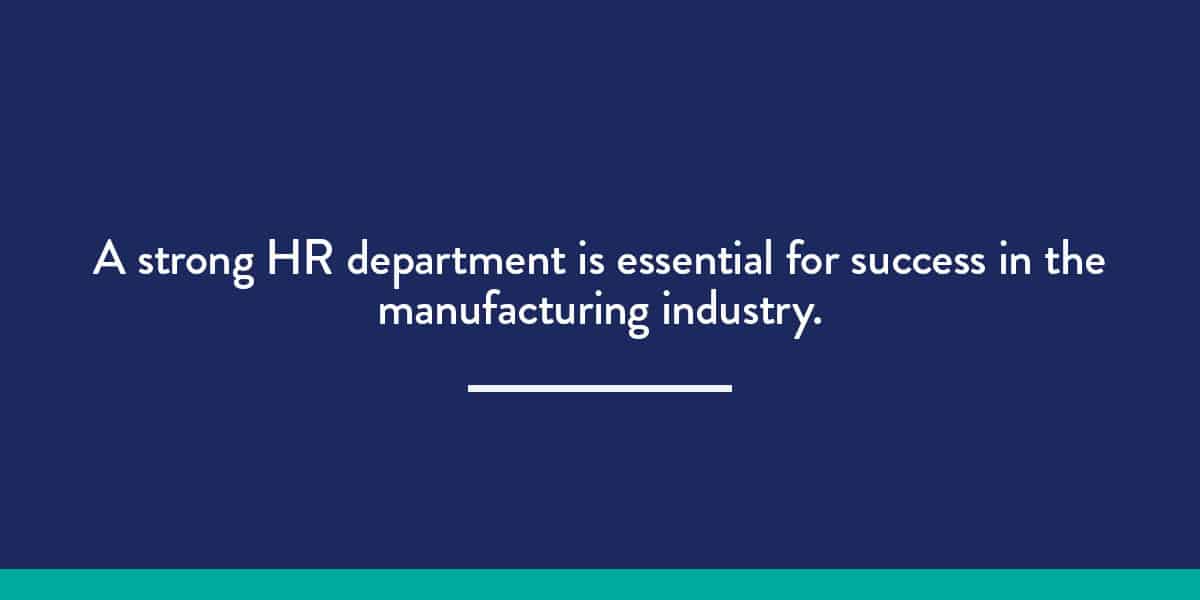Human Resources
Your Guide to HR Support for Manufacturing Companies

Managing your human capital is more vital than ever in today’s unpredictable economic landscape. However, it can be challenging to get the job done when you lack the means or time to address all your most pressing human resources tasks.
This brief guide will explain HR’s vital role in the manufacturing industry and the various options for streamlining your HR operations.
In This Article:
- The Unique Challenges of HR in the Manufacturing Industry
- The Critical Role of HR in Manufacturing
- The Benefits of Outsourcing HR Services for Manufacturing Companies
- Choose Exude Human Capital for Manufacturing HR Support
The Unique Challenges of HR in the Manufacturing Industry
HR professionals in manufacturing organizations face specific obstacles in managing their day-to-day operations due to the physically demanding nature of manufacturing jobs and the many safety regulations and industry standards.
High Employee Turnover
Manufacturing has an especially high turnover rate — in one 2023 survey of 600 employees, 56% said they planned to leave their jobs within the year. And 45% of respondents said departures were higher than ever, which is a serious issue in an industry where every employee directly contributes to company output.
Here are some of the most common reasons manufacturing employees leave their jobs.
- Burnout: A combination of overwork due to the skills gap and a lack of recognition from leadership cause manufacturing employees to burn out more quickly than in other industries.
- Unclear expectations: When management does not clearly explain each employee’s roles and responsibilities, team members are likely to feel unstable in their employment.
- Inadequate compensation: Workers may leave your company if they can get better pay and benefits elsewhere.
Extensive Compliance Requirements
Manufacturing is a highly regulated industry, especially in sectors like pharmaceuticals and food and beverage. HR professionals in manufacturing should become familiar with a long list of occupational safety regulations and keep up with frequent regulatory updates.
Because organizations must comply with federal, state and local labor laws, it’s easy for HR professionals at small businesses to become lax in their compliance management and reporting duties. Companies must either hire larger in-house HR teams or outsource some operations to third parties to reduce noncompliance risk.
The Critical Role of HR in Manufacturing
Perhaps more than in most other sectors, a strong HR department is essential for success in the manufacturing industry. HR teams manage a long list of responsibilities, such as the following.
Talent Acquisition and Retention
With such a high turnover rate, skilled HR professionals are critical for sourcing and hiring top talent in the manufacturing industry. Companies need to attract diverse workforces of qualified, motivated employees to remain productive, and retaining that talent is essential for business continuity and labor cost savings.

Benefits Administration
Competitive pay and benefits packages are essential for retaining employees in manufacturing. HR teams must develop and effectively administer these packages to ensure every team member can access the benefits they deserve.
Here are some of the most critical components of a competitive benefits plan in the manufacturing industry.
- Paid time off
- Flexible work schedules
- Robust health insurance coverage
- Good retirement plans
- Potential for promotion within the company
- Opportunities for professional development
A compelling benefits package does more than attract and retain new talent. It’s also vital for maintaining your reputation as a top employer, impressing customers and maximizing your revenue generation.
Diversity Programming
An equitable and inclusive workplace culture keeps employees engaged and maintains high company performance. HR professionals oversee diversity, equity, inclusion and belonging initiatives by:
- Sourcing and hiring diverse talent
- Collecting data on company culture
- Educating employees on DEI principles
A company culture that embodies DEIB values helps employees feel more connected to the organization by creating a more inclusive, welcoming workplace. And in an industry where every employee matters, fostering that culture is vital for maximizing output.
Compliance Management and Reporting
HR personnel must stay abreast of the changing compliance landscape and ensure your workplace always adheres to those requirements. HR departments should regularly audit and report occupational safety data to the relevant authorities, then communicate their findings to company leadership and employees.
Additionally, HR teams develop and administer training programs to facilitate continuous improvement and resolve noncompliance issues. While these initiatives can be challenging to implement due to short time frames and complex regulations, they’re essential for effective compliance management.
Training and Onboarding

HR departments are instrumental in welcoming new hires into the company. They develop and administer training and onboarding programs using various methods, including online courses and in-person classes.
They also work with existing employees to deliver ongoing training programs for continuous improvement. These initiatives address the skills gaps in your current workforce, so you can stay competitive and save money on hiring new talent. Additionally, employees feel more engaged with their work when they have the skills to take on new responsibilities and grow within the company.
The Benefits of Outsourcing HR Services for Manufacturing Companies
One option your company has is to outsource some or all of your HR operations to a third party. Here’s how outsourced HR manufacturing services can help your business gain a competitive edge.
- More effective recruiting: Professional recruiters can help you create more competitive job postings, screen applicants and build a diverse workplace while you focus on maximizing output.
- Streamlined compliance management: HR professionals with specialized expertise in manufacturing regulations can simplify compliance and reporting tasks, reducing your risk of noncompliance penalties.
- Higher productivity: Outsourcing HR duties frees up time for your in-house team to focus on core operations, which is especially beneficial for small businesses with limited resources.
- Advanced tools: Working with an HR consulting company gives you access to the latest software and organizational methodologies, which can boost your HR efforts without requiring you to invest in these tools yourself.
You must pick a reliable consultant if you choose to outsource manufacturing HR operations. That’s our goal at Exude Human Capital.
Choose Exude Human Capital for Manufacturing HR Support
Manufacturing requires a unique approach to HR operations — and small businesses often struggle with finding the resources and human capital to meet those requirements. At Exude, we strive to close that gap by providing our clients with comprehensive HR outsourcing and consulting solutions.
When you partner with us, we’ll match your company with an experienced HR professional. We’ll also tailor your services to meet your unique needs, so whether you need part-time, full-time or even remote HR services, you can maximize your ROI.
Ready to get started? Contact us online today for more information about our specialized HR consulting services.








